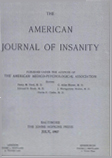CLINICAL AND BIOLOGICAL INTERRELATIONS BETWEEN SCHIZOPHRENIA AND EPILEPSY
Abstract
1. In the majority of cases showing an association of epileptic and schizophrenic symptoms, we may deal either with symptomatic epilepsy in schizophrenia, or, what is more common, with a symptomatic schizophrenia in epilepsy.
2. The number of cases showing a mixed symptomatology is very small compared with the vast number of schizophrenics and epileptics where a combination of the two disorders is not present.
3. The clinical, genetic and EEG evidence up to date does not permit the conclusion that epilepsy and schizophrenia are related disorders.
4. The group of schizophrenics showing abnormal EEG findings suggestive of epilepsy has to be split off from the schozophrenias and treated as a separate entity, similar to other organic psychoses with schizophrenic-like symptoms.
Access content
To read the fulltext, please use one of the options below to sign in or purchase access.- Personal login
- Institutional Login
- Sign in via OpenAthens
- Register for access
-
Please login/register if you wish to pair your device and check access availability.
Not a subscriber?
PsychiatryOnline subscription options offer access to the DSM-5 library, books, journals, CME, and patient resources. This all-in-one virtual library provides psychiatrists and mental health professionals with key resources for diagnosis, treatment, research, and professional development.
Need more help? PsychiatryOnline Customer Service may be reached by emailing [email protected] or by calling 800-368-5777 (in the U.S.) or 703-907-7322 (outside the U.S.).



